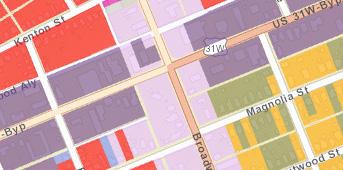Dolan v. City of Tigard (512 U.S. 374 [1994]) - Conditions that a land owner dedicate land or money must be roughly proportional to the impact of the proposed development. Loreto Development Co. v. Village of Chardon (695 N.E.2d 1151 [Ohio Ct. App. 1996]) - Zoning prohibiting bix box stores was constitutional because the zoning did not deprive the owner of all uses of property or make the use highly unlikely or practically impossible and the zoning was considered to advance a legitimate government interest to prevent noise, congestion, and preserve the small town atmosphere. Conforti v. City of Manchester (677A.2d 147 [N.H. 1996]) Zoning ordinances do not apply to uses or structures that existed at the time an ordinance was enacted. Renovations of an existing nonconforming building cannot change the existing nonconforming use unless the change is to something permitted by the current zoning regulations.
Ecogen, LLC v. Town of Italy (438 F. Supp. 2d 149 [W.D.N.Y. 2006]) - Moratoriums must bear a rational relationship to a legitimate government purpose but should not last for an unreasonable amount of time. Center Bay Gardens v. Tempe (153 P.3d 374 [Ariz. Ct. App. 2007]) - While states typically require a particularized injury beyond general economic or aesthetic losses and greater than any injury suffered by the rest of the community to have standing, Arizona allows a person “aggrieved” by a zoning decision to appeal that decision if they can allege “particularized harm” that can include economic injury. Hernandez v. City of Hanford (159 P.3d 33 [Cal. 2007]) - Zoning prohibited certain uses from a planned commercial district in order to limit competition with local businesses downtown. The discrimination between big and small stores in the planned commercial district was valid because it is related to a legitimate government interest of protecting downtown.
Johnson v. Town of Edgartown (680 N.E.2d 37 [Mass. 1997]) - It is up to the municipality that has zoning authority to determine what would cause harm to the public interest. The Judiciary will leave that up to the local government. Ziervogel v. Washington County Board of Adjustment (676 N.W.2D 401 [Wis. 2004]) - No reasonable use zoning rule that restricts any zoning variances may cause unnecessary hardship and this case shows criteria for determining unnecessary hardship as a result of a no reasonable use rule.
19







